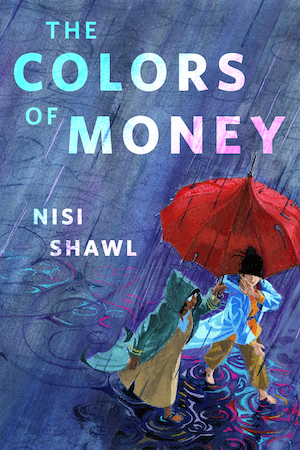There’s always risk in wanting to become a legend… and the price might be your very soul.
We’re thrilled to share the cover and preview an excerpt from The Adventures of Amina al-Sirafi, the start of a new fantasy trilogy from author Shannon Chakraborty—publishing March 7, 2023 with Harper Voyager. For updates, sign up for the author’s newsletter here.
Shannon Chakraborty, the bestselling author of The City of Brass, spins a new trilogy of magic and mayhem on the high seas in this tale of pirates and sorcerers, forbidden artifacts and ancient mysteries, in one woman’s determined quest to seize a final chance at glory—and write her own legend.
Amina al-Sirafi should be content. After a storied and scandalous career as one of the Indian Ocean’s most notorious pirates, she’s survived backstabbing rogues, vengeful merchant princes, several husbands, and one actual demon to retire peacefully with her family to a life of piety, motherhood, and absolutely nothing that hints of the supernatural.
But when she’s tracked down by the obscenely wealthy mother of a former crewman, she’s offered a job no bandit could refuse: retrieve her comrade’s kidnapped daughter for a kingly sum. The chance to have one last adventure with her crew, do right by an old friend, and win a fortune that will secure her family’s future forever? It seems like such an obvious choice that it must be God’s will.
Yet the deeper Amina dives, the more it becomes alarmingly clear there’s more to this job, and the girl’s disappearance, than she was led to believe. For there’s always risk in wanting to become a legend, to seize one last chance at glory, to savor just a bit more power… and the price might be your very soul.

From the author:
I wrote The Adventures of Amina al-Sirafi as the sort of book I’ve been craving for the past few years: a madcap adventure tale that offers excitement and escapism, but also a good dose of heart.
The story follows the escapades of a former pirate and ship’s captain, the eponymous Amina al-Sirafi, when she’s pulled out of retirement and hired to track down the kidnapped daughter of a late comrade. Offered a fortune and a righteous cause, Amina seizes on the chance to have her “one last adventure.” But she no sooner starts getting her gang back together, than it becomes pretty clear the assignment is both more dangerous and more supernatural than they expected.
The book is inspired by and meant to be in conversation with the travelogues, adventure stories, and “wonder literature” so popular in the medieval Islamicate world: the most famed examples perhaps being the accounts of Ibn Battuta, the 1001 Nights (the world’s most popular and enduring speculative fiction stories!), and al-Qazwini’s Marvels of Creation. I’ve long adored these stories—very little brings the past alive more than tales of extremely relatable travel disasters, clever con artists, and astonishing creatures.
I’ve admired Ivan’s work since I first spotted his stunning design for The Priory of the Orange Tree by Samantha Shannon. Once we were discussing featuring a sea monster on the cover, he immediately sprang to mind and ended up knocking it out of the park. From the vibrant color work to the menacing beast, it evokes the sense of dangerous, chaos, and adventure I was hoping for. Ivan also did a wonderful job of incorporating the historical details I shared; I wanted this to look like a vessel they would have actually sailed in the 12th century Indian Ocean.
***
Shannon Chakraborty is the author of the critically acclaimed and internationally bestselling Daevabad Trilogy. Her work has been translated into over a dozen language and nominated for the Hugo, Locus, World Fantasy, Crawford, and Astounding awards. You can find her online at her website or on Instagram and Twitter as @SAChakrabooks.
Buy the Book


The Adventures of Amina al-Sirafi
Chapter 5
Ah, Aden. What can I tell a collector of tales about Yemen, that most glorious and blessed land, that they do not already know? I suspect you can spout plenty of verses extolling the wealth of the famed kingdoms of Saba and Himyar, and know by heart the epics of the warrior-king Sayf and his djinn companions in these lands. And at first blush, one might think Aden—Yemen’s most valuable pearl—would embrace the bewitching legend of its countryside. Perched upon the sunken crater of a long-dead sea volcano and ringed by jagged peaks that tear at the sky, the city’s very location seems out of a book of myths. There is but a single pass through the mountains, one said to have been carved by Shaddad bin ‘Ad himself during his conquests of the world before Islam. Curved around a bright blue bay, Aden gazes down upon its harbor like an eager audience in an amphitheater, with three forts, a new seawall, and numerous gates adding to its already fearsome natural fortifications. It is though the Almighty Himself decided to protect it. Sailing past its ancient breakwater—the stones said to have been set there by giants—it might feel as though you have entered a mythical port of magic from a sailor’s yarn.
You would be sorely mistaken.
Aden is where magic goes to be crushed by the muhtasib’s weights, and if wonder could be calculated, this city would require an ordinance taxing it. It is a den of number-crunching scribes, overly zealous accountants, and tax clerks who have you locked up if you so much as jest about bribes. There is money to be made for people like me: you can charge an excellent rate to smuggle goods around the city’s onerous customshouse. But to what end if there is not a tavern in which to spend your hard-earned coin and the only company to be found is with a bunch of law-abiding bureaucrats?
Dalila and I had chosen to make the trip overland and through the main pass rather than upon the sea, where those in charge of clearing travelers were more thorough (and by “thorough,” I mean they hire ladies who inspect everything). We had another reason for traveling discreetly as well. Though I couldn’t entirely blame Salima for how she approached me, Dalila had been less than pleased to learn how prepared the elderly noblewoman had been to reveal my location to my old foes. And by “less than pleased,” she called me a fucking idiot and went into a great harangue about risk management that convinced me she regularly murdered curious neighbors.
Nonetheless, by the time we arrived in Aden, we had a new plan. Salima was no doubt impatiently awaiting my arrival, but we would not go to her right away. Instead we would meet up with Tinbu and the Marawati and spend a few days taking the temperature of the city and inquiring after our mysterious Frank. Politics shift swiftly around here, and I did not wish to get caught in a situation unawares. For all I knew, Salima was working with the governor himself to set a trap for me.
All right, yes, all that came from Dalila as well. See? This is why I recruited her first. Sometimes one needs a paranoid poisoner at their side.
As it was, we made it through the pass and into the city unbothered. I insisted on going to the Marawati straightaway, and as we strolled onto the beach I could not help but marvel at the difference a decade had made. One of the blessings of age is the waning of certain men’s eyes, of that stare that fixes upon you when you are a girl too young to notice. The men who do not lower their gaze as is commanded by our faith, but instead steal second and third glances; the men who hiss the vulgarest of obscenities and when called out, blame their behavior on your clothes, your smile or lack thereof, your pretty eyes, your very existence.
The men who always seem very surprised to be knocked on their ass and splitting bloody teeth when attempting such tricks on ill-tempered lady pirates. But happily past forty and dressed in the mended garments of fishwives, Dalila and I might have been invisible as we strode across the hot sand. We passed the seawall, and I paused to admire the unobstructed view of Sira Bay.
Aden’s harbor was gentle and the expanse of azure water—a sailor’s dream, clear of the coral and shoals that make most of the ports north of here so deadly—was dotted with about twenty ships, mostly the big sanabiq that carry trade goods to the East African and Indian coasts. A few more boats had been dragged onto the narrow beach for repairs, the muddy flats crowded with sweating laborers tightening hull stitches, making rope, and mixing sealant. The smell of coir and pitch combined with the salty breeze and reek of fish guts on the humid air to make a smell only a sailor could love. New mansions and promenades glistened in the distant hills, where their wealthy inhabitants could enjoy stunning sea vistas and pleasant breezes, but Aden’s newest construction boom appeared to have missed its poor: the palm frond huts on the sweltering beach—huts I spent a not-insignificant portion of my childhood in—looked as miserable as ever.
I fanned my face with the end of my turban as we made our way through a maze of wooden hulls, shark-oil–filled barrels, carpentry tools, lengths of rope, and flapping sails. The hot sand crunched beneath my thin sandals, and I was drenched with sweat in moments. Longing to spy my Marawati and plunge into the ocean, I stopped in the shade of a large sunbuq framed by stilts. Still, no one had bothered us. God, give us a couple tins and we could have boarded a ship claiming to be delivering food to hungry husbands and stolen it.
But I did not want any stolen ship, I wanted my stolen ship. I shaded my eyes, the sun’s glare upon the water fierce, and scanned the boats drifting in the bay.
“Do you see it?” Dalila asked.
“No. Though knowing Tinbu, she is likely nigh unrecognizable.” There is no one who knows his way around boats like Tinbu, my former first mate and the man who has been captaining the Marawati in my stead since I retired. He can break a ship down and build it anew in ways one would never imagine. “Look for similarly sized hulls.”
“Mama!”
On instinct, I turned and spotted a little girl running across the sand, her black braids bouncing behind her. Giggling, she crashed into a group of women mending nets and dropped to the ground, her hands full of oyster shells.
My heart panged. I was trying to preoccupy myself with work, but I could not go an hour without thoughts of Marjana, and the sight of any child made me ache. Was my daughter eating enough and staying safe? Did she miss me or had she gotten distracted in the blissful way of children? I watched the girl settle into her mother’s lap, the smiles exchanged between them driving a knife of loneliness through my chest.
“Amina.” Dalila tugged on my sleeve. “Can you see what is happening over there?”
I followed the direction of her glance. On the southern side of the harbor, closer to Sira Island, a group of people had gathered on the beach. There seemed to be some sort of commotion; their gazes were directed at the sea and excited chatter drifted our way. I glanced back upon the boats I had already examined thrice, but my Marawati was not there.
Nor did I like the energy of the growing crowd, an ill premonition knotting my belly. “Let us check it out.”
The crowd had gathered upon a sloping sand dune that made it difficult to see anything of the sea beyond glistening shards of water. I pulled the tail of my turban across the lower part of my face in case the years had not aged me into anonymity, and Dalila and I separated without a word, melting into the group.
“—think they shall find anything?” a man coated in wood dust whispered to his companion.
“Heard their throats were slashed to the bone, crabs crawling out of their mouths—”
I jostled past two boys, one hoisting the other to peer over the shoulders of the men in front of them. With an elbow to the ribs of a sailor and a rude shove to a matronly looking woman who let out an offended squawk, I was free of the mob with a clear view of the commotion.
And there, swaying in the gentle waves like a comely dancer, was my Marawati.
I praised God under my breath, my soul eased at the sight of my first love at, the ship I’d have cast all my ex-husbands overboard to save. She was a true beauty, India-made with a narrow hull of the finest dark teak. Her name was original, though I’ve little idea what it means; my grandfather was as cagey about the Marawati’s name as he was regarding the no doubt illegal way he obtained her. She was not overly large, but with a full complement of oarsmen and a deft hand controlling the vast sails and two rudders, she was one of the swiftest vessels on the sea, capable of fleeing far bigger warships.
Not that she looked like it at that moment. The oars and the rails that held them were nowhere to be seen, the decked platforms where we launched weapons were dismantled, and the rudder and stern ornaments had been changed. The hull and masts had been painted an ugly yellow-tinged green that looked like it needed to be refreshed twenty years ago, and between the fraying nets and rusty chains, the Marawati looked less like a speedy smuggling vessel and more like a fishing boat used to coast along the shore. The one thing Tinbu had not altered—my sole request— were the wooden rondels my grandfather had carved along the captain’s bench.
However, my eyes had barely settled on my beloved ship when said heart-easing abruptly ended. For you see, my Marawati was neither alone nor at peace. It was being actively searched by soldiers and pinned between two large—armed—galleys.
When… in the name of God… had Aden gotten warships?
Excerpted from The Adventures of Amina al-Sirafi by Shannon Chakraborty. Copyright © 2023 by Shannon Chakraborty. Reprinted courtesy of Harper Voyager, an imprint of HarperCollins Publishers.










